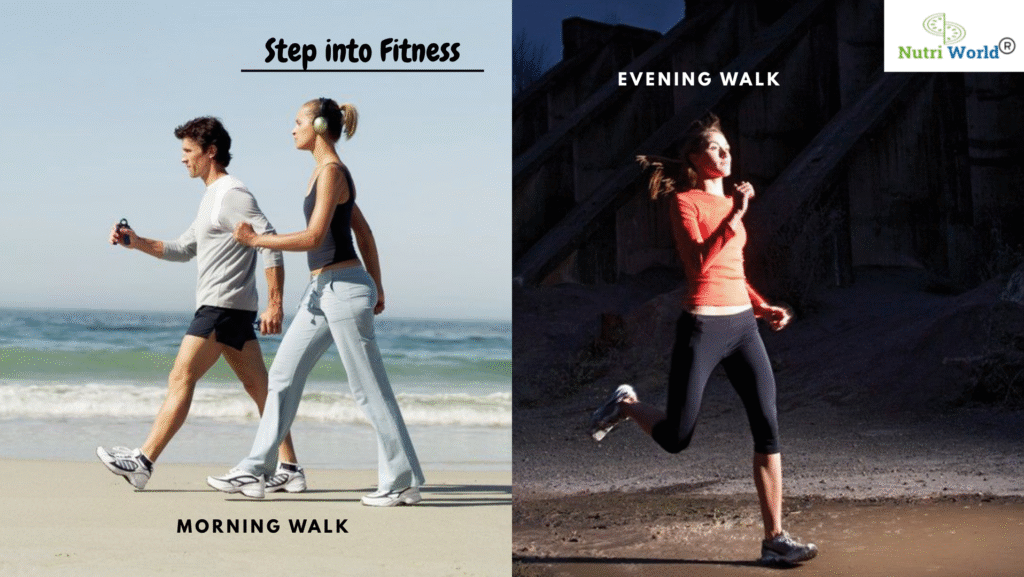When it comes to losing weight, walking is one of the simplest and most underrated forms of exercise. But the big question is — should you walk in the morning or evening to get the best weight loss results? Let’s explore the science, benefits, and practicality behind both to help you decide what works best for your body and lifestyle.

Morning Walk: A Fresh Start to Fat Loss🌅
Benefits of Morning Walk for Weight Loss
1. Boosts Metabolism Early
Walking in the morning jumpstarts your metabolism, especially when done on an empty stomach (fasted cardio). This means you burn more calories throughout the day.
2. Enhances Fat Burning
In the morning, your body’s glycogen (stored energy) levels are low. This encourages the body to use fat as fuel, potentially improving fat-burning efficiency.
3. Regulates Appetite
Morning walks are known to regulate hormones like ghrelin (hunger hormone), which can help curb unnecessary snacking throughout the day.
4. Sets a Healthy Tone for the Day
People who exercise in the morning are more likely to make healthier food choices and stay active throughout the day.
Evening Walk: Unwind and Burn Calories 🌇
Benefits of Evening Walk for Weight Loss
1. Improves Digestion and Blood Sugar Levels
A 20–30-minute walk after dinner helps in better digestion, controls post-meal blood sugar spikes, and prevents fat storage.
2. Reduces Stress Hormones
Evening walks help reduce cortisol levels (stress hormone), which can otherwise lead to stubborn belly fat and cravings.
3. Boosts Sleep Quality
Better sleep supports weight loss by balancing hunger hormones and reducing late-night snacking tendencies.
4. Greater Muscle Activation
Body temperature and flexibility are better in the evening, allowing for a brisker pace and more intense walking sessions.
Morning vs Evening Walk: The Science Behind Weight Loss
What Does Research Say?
- A study published in Obesity journal found that individuals who worked out in the morning had greater overall physical activity throughout the day.
- Another study in the Journal of Sports Sciences noted that evening exercisers had slightly better endurance and performance due to higher body temperature and better muscle function. In essence, both time slots show benefits, but the key is consistency.
Factors to Consider While Choosing Your Ideal Walking Time
1. Your Daily Schedule
If you’re a morning person, walking early might be more consistent. If you feel more energetic post-work or after dinner, evening might be better.
😴 2. Sleep Patterns
Sleep-deprived mornings can sabotage your walk. Likewise, intense late-night walks may interfere with sleep.
🌡 3. Weather Conditions
Morning walks offer cooler temperatures in summer. Evening walks may be preferable during winter evenings when it’s slightly warmer.
4. Your Fitness Goal
- Fat Loss: Morning fasted walks may slightly edge out.
- Digestion & PCOS/Insulin Resistance: Evening walks post-meal have shown great results.
Best Tips to Maximize Weight Loss with Walking
- ✅ Walk for at least 30–45 minutes, 5 days a
- ✅ Maintain a brisk pace (100–120 steps per minute).
- ✅ Add arm movement or light ankle weights to
- ✅ Focus on nutrition and hydration—walking alone isn’t
- ✅ Combine with strength training 2–3 times a week for better
FAQs
Q1: Can I do both morning and evening walks?
Yes! If time allows, splitting 30 minutes between AM and PM can support digestion and metabolism throughout the day.
Q2: Which walk burns more fat — morning or evening?
Fasted morning walks may burn slightly more fat, but total calorie deficit and consistency matter more.
Q3: Is walking after dinner good for weight loss?
Yes, walking 15–30 minutes after dinner helps with digestion, regulates blood sugar, and reduces fat accumulation.
🏁 Conclusion: So, Which Walk Wins for Weight Loss?
There’s no one-size-fits-all answer. Morning walks may give a metabolic edge, while evening walks aid in digestion and stress relief. The best time to walk is when you can do it regularly and joyfully.
No matter when you walk, just lace up, show up, and let your steps add up. Your weight loss journey is built not just on timing — but on consistency, effort, and self-love.

Hi, I’m Dietitian Dipanwita Saha, A Clinical Dietitian & Nutripreneur and The Founder & Director of Nutri World. I believe healthy eating should be enjoyable, balanced, and free from guilt—not about strict rules or cutting out your favorite foods. My passion lies in helping people heal their relationship with food, especially those dealing with disordered eating. If you’re looking for a supportive, judgment-free space to nourish your body and mind, I’m here to help—let’s make food feel good again.









